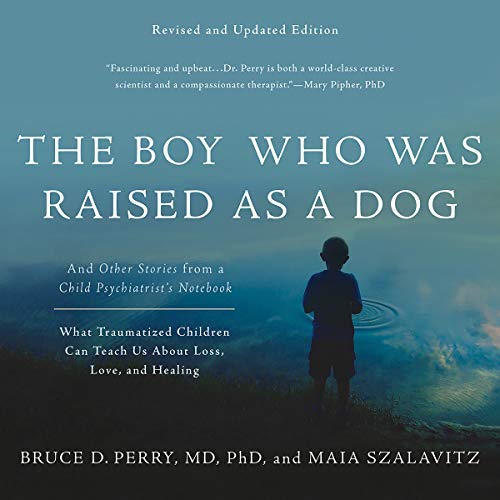For anyone interested in the healing of childhood trauma, I strongly recommend you read, The Boy Who Was Raised as a Dog: And other Stories From a Child Psychiatrists Notebook by Bruce Perry and Maia Szalavitz. Here is a description of the book from the back cover:
‘What happens when a child is traumatized? How does terror affect a child’s mind—and how can that mind recover? Child psychiatrist Bruce Perry has treated children faced with unimaginable horror: genocide survivors, witnesses to their own parents’ murders, children raised in closets and cages, the Branch Davidian children, and victims of family violence.
In The Boy Who Was Raised as a Dog, he tells their stories of trauma and transformation. Dr. Perry clearly explains what happens to the brain when children are exposed to extreme stress. He reveals his innovative methods for helping ease their pain, allowing them to become healthy adults. This deeply informed and moving book dramatically demonstrates that only when we understand the science of the mind can we hope to heal the spirit of even the most wounded child.’
Here is an important section of the book—with my paragraphing—focused on the importance of relationships and connection:
‘Trauma and our responses to it cannot be understood outside the context of human relationships. Whether people have survived an earthquake or have been repeatedly sexually abused, what matters most is how those experiences affected their relationships—to their loved ones, to themselves and to the world.
The most traumatic aspects of all disasters involve the shattering of human connections. And this is especially true for children. Being harmed by the people who are supposed to love you, being abandoned by them, being robbed of the one-to-one relationships that allow you to become safe and valued and to become humane—these are profoundly destructive experiences.
Because humans are inescapably social beings, the worst catastrophes that can befall us inevitably involve relational loss.
As a result, recovery from trauma and neglect is also all about relationships—rebuilding trust, regaining confidence, returning to a sense of security and reconnecting to love… healing and recovery are impossible—even with the best medications and therapy in the world—without lasting connections to others.
Indeed, at heart it is the relationship with the therapist [my bold—DC], not primarily his or her methods or words of wisdom, that allows therapy to work. All the children who ultimately thrived following our treatment did so because of a strong social network that surrounded and supported them…’
What maltreated and traumatized children most need is a healthy community to buffer the pain, distress and loss caused by their earlier trauma. What works to heal them is anything that increases the number and quality of a child’s relationships.
What helps is consistent, patient, repetitive loving care. And, I should add, what doesn’t work is well-intended but poorly trained mental health “professionals” rushing in after a traumatic event, or coercing children to “open up” or “get out their anger”.
However, because it is exactly those children who are most vulnerable to trauma who are least likely to have a healthy, supportive family and community, it is exceedingly difficult to provide effective help through the current systems we have in place.
Because healthy communities themselves are often what prevents interpersonal traumatic events (like domestic violence and other violent crime) from occurring in the first place, the breakdown of social connection that is common in our highly mobile society increases everyone’s vulnerability.
If we are to successfully raise healthy children, children who will be resilient in the face of any traumatic experience they may encounter—and some 40 percent of children will experience at least one potentially traumatic event before they become adults—we need to build a healthier society.’ Bruce Perry and Maia Szalavitz
I cannot emphasise enough to you how important these words are. You’ll be reading and hearing much more from Bruce Perry on this website over time.


